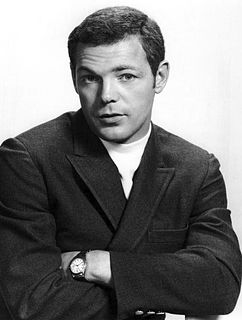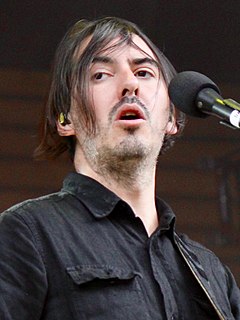A Quote by Clarence Darrow
The objector and the rebel who raises his voice against what he believes to be the injustice of the present and the wrongs of the past is the one who hunches the world along.
Related Quotes
Originally the structure was . . . a modern narrator who would appear intermittently and talk about his memories of his grandmother, which would then be juxtaposed against scenes from the past. But the stories from the past were always more interesting that the things in the present. I find this almost endemic to modern plays that veer between past and present. . . . So as we've gone on developing GOLDEN CHILD, the scenes from the past have become more dominant, and all that remains of the present are these two little bookends that frame the action.
We think that the world is limited and explained by its past. We tend to think that what happened in the past determines what is going to happen next, and we do not see that it is exactly the other way around! What is always the source of the world is the present; the past doesn't explain a thing. The past trails behind the present like the wake of a ship and eventually disappears.
Today, there are those who say that marriage is out of fashion... They say that it is not worth making a life-long commitment, making a definitive decision, ‘for ever’, because we do not know what tomorrow will bring. I ask you, instead, to be revolutionaries, I ask you to swim against the tide; yes, I am asking you to rebel against this culture that sees everything as temporary and that ultimately believes you are incapable of responsibility, that believes you are incapable of true love.
The other side of my work is political disappointment - the realization that we are living in an unjust world. "Blood is being spilled in the merriest way, as if it was champagne," Dostoevsky says. That raises the problem of justice, what it might mean in an unjust world and whether there can be an ethics and a political practice that would be able to face and face down the injustice of the present. How might we begin to think about that?
Optimism is not only a false but also a pernicious doctrine, for it presents life as a desirable state and man's happiness as its aim and object. Starting from this, everyone then believes he has the most legitimate claim to happiness and enjoyment. If, as usually happens, these do not fall to his lot, he believes that he suffers an injustice, in fact that he misses the whole point of his existence.
God's wrath is not an implacable, blind rage. However emotional it may be, it is an entirely reasonable and willed response to offenses against his holiness. But his love . . . wells up amidst his perfections and is not generated by the loveliness of the loved. Thus there is nothing intrinsically impossible about wrath and love being directed toward the same individual or people at the same time. God in his perfections must be wrathful against his rebel image-bearers, for they have offended him; God in his perfections must be loving toward his rebel image-bearers, for he is that kind of God
Do what he will, he [the profane man] is an inheritor. He cannot utterly abolish his past, since he himself is a product of his past. He forms himself by a series of denials and refusals, but he continues to be haunted by the realities that he has refused and denied. To acquire a world of his own, he has desacralized the world in which his ancestors lived; but to do so he has been obliged to adopt an earlier type of behavior, and that behavior is still emotionally present in him, in one form or another, ready to be reactualized in his deepest being.
As nations we should also commit afresh to righting past wrongs. In Australia we began this recently with the first Australians - the oldest continuing culture in human history. On behalf of the Australian Parliament, this year I offered an apology to indigenous Australians for the wrongs they had suffered in the past.
...as soon as we examine suicide from the standpoint of religion we immediately see it in its true light. We have been placed in this world under certain conditions and for specific purposes. But a suicide opposes the purpose of his creator; he arrives in the other world as one who has deserted his post; he must be looked upon as a rebel against God. God is our owner; we are his property; his providence works for our good.
In the spiritual world there are no time divisions such as the past, present and future; for they have contracted themselves into a single moment of the present where life quivers in its true sense. The past and the future are both rolled up in this present moment of illumination, and this present moment is not something standing still with all its contents, for it ceaselessly moves on.




































